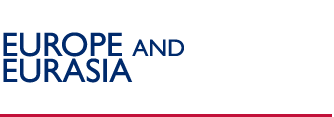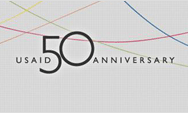 |
 |
|
 |
 |
|
 |
 |
 |
 |
Excellence in Innovation: SMS for Market Prices in BiH
As part of USAID and Norway’s Excellence in Innovation Project, daily wholesale prices of fresh fruits and vegetables are available through a simple SMS for the first time in Bosnia-Herzegovina.
|
|
 |
 |
|
 |
|
 
Contacts
Assistant Administrator
Paige Alexander
Senior Deputy Assistant Administrator
Roberta Mahoney
Deputy Assistant Administrator
Jonathan Hale
Press Inquiries
U.S. Agency for International Development
Office of Press Relations
Ronald Reagan Building
Washington, D.C.
20523-0016
Tel: 202-712-4320
Fax: 202-216-3524
Public Inquiries
USAID Missions
Europe and Eurasia
Overview
Beginning in 1989 in Eastern Europe and then in 1992 in Eurasia, USAID began the historic task of assisting the transition of the Eastern Bloc into free, prosperous, market-oriented democracies. USAID can report substantial successes with lasting strategic import over the last twenty years, helping to build and extend Euro-Atlantic institutions and secure broad advances for the benefit of the people of Eastern Europe and Eurasia. From our original 24 countries, 11 have graduated from USAID assistance, 17 have joined the WTO, 10 have acceded to the EU, and 12 have been invited to join NATO. Currently, USAID operates programs in 15 countries through 11 Missions and a Regional Services Center based in Budapest.
Challenges
While the countries of Europe and Eurasia are progressing in their transitions, development challenges remain which prevent a complete transformation into a region that is whole, free and at peace. USAID continues to tackle the region’s fundamental transition challenges of pervasive corruption, authoritarian rule, weak policy and regulatory environments, significant poverty and unemployment, and inadequate health and social protection systems.
USAID's Response
USAID responds to these challenges with innovative programming that emphasizes economic growth, democratic governance, education, health, and social reform to create a more secure, democratic and prosperous region.
USAID’s budget in the in Europe and Eurasia reflects a sound investment of U.S. resources through our commitments to:
- Partner with Russia as an emerging donor while pressing for respect of universal values and democratic liberty;
- Enhance stability in the Caucasus through assistance for economic growth and trade, confidence building measures, institutional and civil society development
- Re-energizing pre-conflict gains in Georgia;
- Promote democratic and economic reform in Ukraine;
- Support Moldova’s progress toward European integration by strengthening democratic institutions and promoting economic growth;
- Address the most difficult challenges to democracy and human rights, like those seen in Belarus; and
- Increase stability in the western Balkans by helping countries there reach their goal of Euro-Atlantic integration, through programs that strengthen economic opportunity, build democratic institutions, and promote tolerance and reconciliation.
Each country program in the region is guided by a multi-year strategic plan that identifies the sectors in which USAID will work and estimated levels of funding. The Europe and Eurasia Bureau and field offices work in close partnership with U.S. and local non-governmental organizations, private businesses, universities, international organizations and the governments of host countries to achieve long-lasting results. With FY2010 resources, the Europe and Eurasia Bureau is managing more than $600 million in U.S. assistance across the region.
USAID Success Stories in Europe and Eurasia
After twenty years of engagement, USAID programs have helped integrate several countries into global markets and institutions, supported Central and Eastern European states as they prepared for entry into the EU and transatlantic institutions. Highlights of the impact of our work include:
- From the original 24 countries, 11 have graduated from USAID assistance, 17 have joined the WTO, 10 have acceded to the EU, and 12 have joined NATO;
- Our 11 “graduates” are among the strongest supporters of U.S. global objectives and are moving from being aid recipients to becoming aid providers;
- Legacies of lasting success, including enterprise funds and new emerging donors, have continued to achieve positive development outcomes catalyzed by USAID;
- 145 public/private sector alliances have effectively leveraged $371 million from partners to address challenges facing the region;
- In some countries in the region, civil society has blossomed from virtually nothing to become a significant force, both in service delivery and advocacy;
- Strengthened independent media, civil society, and political coalitions that have played a major role in the democratic breakthroughs in the region, including in Serbia, Moldova, Ukraine, and Georgia;
- Models of effective and efficient social systems have been successfully adapted and replicated, including innovative health, education, and social protection approaches; and
- Professional energy regulatory authorities are in place in all USAID partner countries in the region.
Back to Top ^
|




